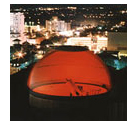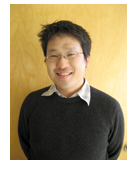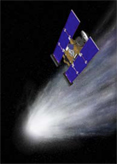Out of Class Participation Activities
The following activities, if properly documented, are considered valid for participation credit (in place of, for example, index cards). Attend one of the Astronomy Department-sponsored Star Parties, which occur on Wednesday, Friday, and Saturday
evenings during the semester, weather permitting. The Wednesday night events are held on the roof of RLM Hall,
while the Friday and Saturday ones use the telescope on the roof of Painter Hall. See details
here. Important:
In order to receive credit for this activity, you must request a signed slip from the person in charge, and turn
it in to the T.A. within the next week. No more than two Star
Parties can count for participation credit.
Attend one of the Astronomy Department-sponsored Star Parties, which occur on Wednesday, Friday, and Saturday
evenings during the semester, weather permitting. The Wednesday night events are held on the roof of RLM Hall,
while the Friday and Saturday ones use the telescope on the roof of Painter Hall. See details
here. Important:
In order to receive credit for this activity, you must request a signed slip from the person in charge, and turn
it in to the T.A. within the next week. No more than two Star
Parties can count for participation credit.
 A public lecture on "Frontiers in Cosmology" will be presented by Prof. Eiichiro Komatsu of the Department of
Astronomy on Saturday, February 7 at 1:00 PM in the Avaya Auditorium, Room 2.302 on the ground floor
of the ACES building, at the corner of 24th Street and Speedway. This is another opportunity to earn participation
credit through an out of class activity. In order to receive credit, you will need to turn in a brief write-up
summarizing what you heard and learned at the talk, no later than the start of class on Thursday, February
12. This must be turned in as hard copy (on paper), not emailed; I prefer it to be typed, since it must be
legible. You can earn 1 or 2 credits for this assignment, depending on the quality of your effort, not on
whether you understand everything you hear, which would not be fair since that is background-dependent.
You must personally attend the lecture in order to receive credit. I strongly advise you against copying
someone else's notes and trying to turn that in. Not only does that constitute a violation of UT's Honor
Code, but I have an uncanny ability to recognize attempts to cheat!
A public lecture on "Frontiers in Cosmology" will be presented by Prof. Eiichiro Komatsu of the Department of
Astronomy on Saturday, February 7 at 1:00 PM in the Avaya Auditorium, Room 2.302 on the ground floor
of the ACES building, at the corner of 24th Street and Speedway. This is another opportunity to earn participation
credit through an out of class activity. In order to receive credit, you will need to turn in a brief write-up
summarizing what you heard and learned at the talk, no later than the start of class on Thursday, February
12. This must be turned in as hard copy (on paper), not emailed; I prefer it to be typed, since it must be
legible. You can earn 1 or 2 credits for this assignment, depending on the quality of your effort, not on
whether you understand everything you hear, which would not be fair since that is background-dependent.
You must personally attend the lecture in order to receive credit. I strongly advise you against copying
someone else's notes and trying to turn that in. Not only does that constitute a violation of UT's Honor
Code, but I have an uncanny ability to recognize attempts to cheat!
 Professor Donald E. Brownlee will present the undergraduate lecture, "Rare Earth?" Wednesday, March 11 at 4:15 P.M.
in RLM 4.102. Earth is unique in our solar system, but is it unique among extrasolar planets? Is it easy to make Earths?
How Earth-like does a planet really have to be to support life like us? Donald E. Brownlee is Professor of Astronomy at the
University of Washington. His research interests include investigations of interplanetary dust, comets, meteorites, and the
origins of the solar system. He is currently the principal investigator for
NASA's STARDUST Discovery mission (artist's rendering at right), which successfully
recovered matter from comet Wild 2 and returned to Earth--a 3-billion mile, 7-year journey.
Professor Donald E. Brownlee will present the undergraduate lecture, "Rare Earth?" Wednesday, March 11 at 4:15 P.M.
in RLM 4.102. Earth is unique in our solar system, but is it unique among extrasolar planets? Is it easy to make Earths?
How Earth-like does a planet really have to be to support life like us? Donald E. Brownlee is Professor of Astronomy at the
University of Washington. His research interests include investigations of interplanetary dust, comets, meteorites, and the
origins of the solar system. He is currently the principal investigator for
NASA's STARDUST Discovery mission (artist's rendering at right), which successfully
recovered matter from comet Wild 2 and returned to Earth--a 3-billion mile, 7-year journey.